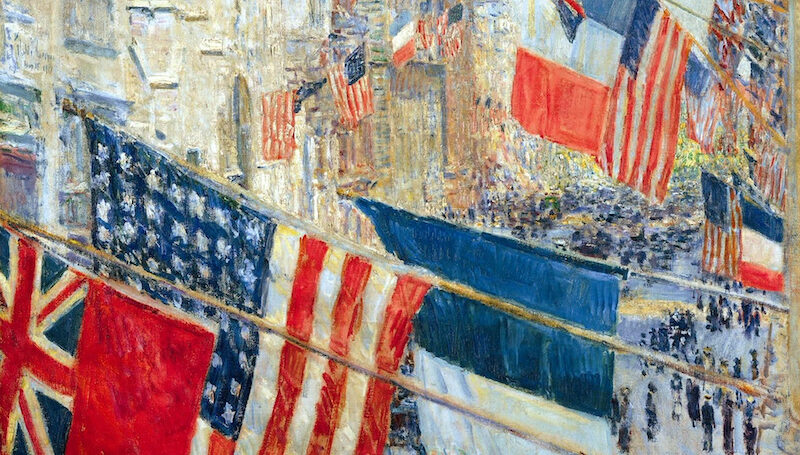Published on National Review Online
For many, the British accent of the Islamist who executed American journalist James Foley was almost as shocking as the barbaric murder itself. In the days that follow, critics of American foreign policy will assert that the Islamic State’s audacious act was merely a symptom of “blowback,” the unintended consequence of Western military involvement in Afghanistan and Iraq. But above all, they will relentlessly stress that the participation of a European Muslim in foreign jihad marks a new development in domestic radicalization. And they will be deeply mistaken.
It is easy to write off the Islamization of European Muslims as an inadvertent and unprecedented outcome of the War on Terror. Alas, the savage exploit performed on the barren dunes of Mesopotamia and broadcast via social media represents the continuation of a relatively longstanding trend. European domestic radicalization and, specifically, the willingness of British Muslims to wage jihad abroad, began in earnest at least 20 years ago.
During the Bosnian War, which lasted from 1992 to 1995, British Muslims traveled to Bosnia to assist their co-religionists in the face of Serbia and Croatia’s genocidal campaign. Some assisted relief organizations, which collected and distributed food, water, medicine, and blankets. Some smuggled weapons and ammunition. Others, however, fought on the frontlines. What started as a largely protective mission transformed into an international offensive to secure the future safety of Muslims through the reestablishment of the caliphate.
A cohort of London-based Islamists, primarily funded by Wahhabi sources, orchestrated a grassroots campaign that seized the hearts of countless young British Muslims. It created and propagated the conspiracy theory that Europe’s unwillingness to intercede in the Balkans was proof of a Christian plot to extinguish Islam. Unfortunately, in retrospect, the Islamist yarn does not seem so far-fetched. A flight from Rome to Sarajevo is only a few hours, meaning that the killing fields were virtually in Europe’s backyard. Three years passed before the West intervened. It was only after the massacre at Srebrenica that NATO air strikes were carried out against Ratko Mladić’s forces. And even then, the response was essentially led by the United States, not Europe.
It is impossible to determine exactly how many British Muslims ventured to Bosnia — not even the British security apparatus was keeping tabs on movement — let alone how many were engaged in violence as opposed to humanitarian activity. That being said, several estimates from a range of sources lead us to believe that the number was not insignificant. A member of the Observer Research Foundation, a New Dehli–based think tank, posited that at least 200 British Muslims were recruited by Harkat ul-Ansar, a Pakistani Islamist group, trained by Pakistan’s Directorate for Inter-Services Intelligence, and then deployed to Bosnia. Moazzam Begg, one of several British Muslims formerly held at Guantanamo Bay, spent time in Bosnia during the war and gauged that there were thousands of British Muslims present. Adam LeBor, in his 1997 title A Heart Turned East, reported that there were so many British Muslims helping the Bosnian army that it became an “almost daily occurrence to see a soldier wearing the blue and white Bosnian fleur-de-lys speaking in a broad Glasgow or Manchester accent.”
For quite a few infamous European Islamists, Bosnia was a proving ground. Egyptian-born Abu Hamza al-Masri, also recognized as Abu Hamza, fought in Bosnia after spending more than a decade living in Britain. (He entered Britain on a student visa in 1979 and studied civil engineering at Brighton Polytechnic College.) Hamza is known for missing an eye and both hands — he claims to have lost them fighting the Soviets in Afghanistan — and for being the one-time firebrand imam of the Finsbury Park Mosque in London. He is awaiting sentencing in September after being convicted of eleven terrorism charges by a federal jury in Manhattan.
Another biography worth noting is that of Ahmed Omar Saeed Sheikh. Sheikh was born in Britain and grew up in Wanstead, a suburban area of northeast London. In 1992, he entered the prestigious London School of Economics. He joined the student Islamic Society, which held a “Bosnia Week” dedicated to highlighting the plight of Bosnian Muslims. A prominent feature of the group’s exhibition was the screening of Destruction of a Nation, a 30-minute video that depicted the ethnic cleansing of Bosnian Muslims in excruciating detail. It unnerved Sheikh. Not long after, he was recruited by Jaish-e-Muhammad, a Kashmir-based Islamist organization. Several months later, he accompanied his father on a business trip to Pakistan, where he secretly linked up with militants from the organization. Upon returning to Britain, he joined a “convoy of mercy” in Bosnia, which purported to deliver humanitarian supplies. Sheikh nevertheless was convinced by a veteran Pakistani militant at the Croatian border to become a jihadist. In 1994, he was arrested in India for kidnapping three Britons and an American. And eight years later, Sheikh was arrested, convicted, and sentenced to death for the abduction and murder of American journalist Daniel Pearl.
From this point forward, Europe must be far more vigilant in tracking its citizens traveling to and from war-torn regions. The West’s broader lesson from the Bosnian experience: “Damned if you do, damned if you don’t.” Masses of individuals were radicalized because of the West’s lack of military action in a conflict involving Muslims. Islamists, bent on the global exportation of sharia, will always find a way to twist events to fit the myopic lens through which they and their supporters see the world. The objective then is to choose the path least damning in terms of our national interests. In this instance, America’s path is clearly not simply “containing” the Islamic State, but summoning all of its might to put the psychopathic legion out of existence — sooner rather than later.
